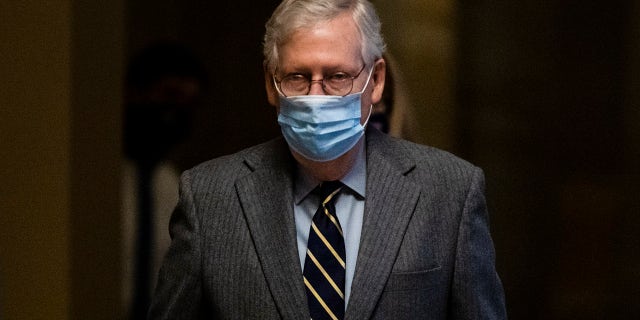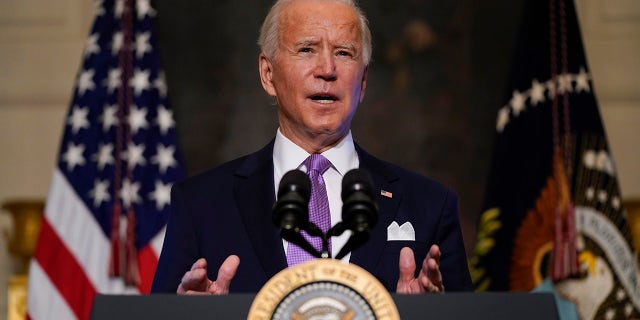McConnell says ‘basic arithmetic’ shows Dems can't kill filibuster. How that hampers these progressive desires

Fox News Flash top headlines for January 27
Fox News Flash top headlines are here. Check out what’s clicking on Foxnews.com.
Senate Minority Leader Mitch McConnell on Tuesday said that “simple arithmetic” assures the legislative filibuster — a 60-vote procedural hurdle for bills in the upper chamber — remains safe for the time being.
McConnell, R-Ky., made the statement after retracting a demand that Senate Majority Leader Chuck Schumer, D-N.Y., agree in writing to preserve the filibuster for this Congress. The demand was no longer necessary, McConnell said, because at least two other Democratic senators said they would not vote to get rid of the provision.
In a 50-50 Senate, that would assure Schumer wouldn’t be able to get rid of the legislative filibuster if he tried.
McConnell and other Republicans have been adamant about protecting the filibuster as a bulwark against simple majority rule in the Senate, even as many Democrats have clamored to get rid of it in order to usher through major agenda items.
FILE – In this Nov. 4, 2020, file photo Republican Sen. Susan Collins, R-Maine, speaks to reporters in Bangor, Maine. Collins led a 2017 letter, signed by many Democrats, supporting the legislative filibuster. Many of those Democrats have now backtracked. (AP Photo/Robert F. Bukaty, File)
“The legislative filibuster defines the Senate as the world’s greatest deliberative body. It would be tragic if it were removed. And I believe the Democrats would rue the day eventually should they pursue that route,” Sen. Susan Collins, R-Maine, said in a statement to Fox News. “This issue is one that frankly the Democrats should back off on and recognize that it is a hallowed tradition of the Senate.”
Collins led a 2017 letter with Sen. Chris Coons, D-Del., which was signed by many Democratic senators, advocating for the preservation of the filibuster. But since then many Democrats, including Coons himself, have backtracked.
A spokesperson for Coons told Fox News last year that “he doesn’t want to get rid of the filibuster, but he won’t sit idly by if Senate Republicans obstruct progress on urgent priorities.”
In floor remarks Tuesday, McConnell was explicit in his threats of the consequences if Democrats were to get rid of the filibuster. He said that Republicans might simply not show up to committee meetings or Senate sessions, denying Democrats a 51-member quorum. Republicans might block the mere scheduling of speeches, or not allow the Senate to convene before noon.
Things would happen either “in the hardest possible way or not at all,” without the filibuster, McConnell warned, and that if Democrats get rid of the filibuster “it would immediately and painfully clear to the Democratic majority that they had indeed just broken the Senate.”
Reps. Ayanna Pressley, D-Mass.; Alexandria Ocasio-Cortez, D-N.Y.; Rashida Tlaib, D-Mich., and senators led by Sen. Elizabeth Warren, D-Mass., and others, have called for ending the filibuster to pursue progressive priorities. Others have indicated they are open to it — including President Biden during the campaign.
“The filibuster is giving a veto to the gun industry, a veto to the oil industry, a veto on immigration,” Warren said in a Democratic presidential debate. “If we want to make progress, it’s time to end the filibuster.”
There are pressing issues, including the coronavirus and the economy, on which both sides will be forced to the table to compromise no matter the filibuster situation. But the near-certain preservation of the filibuster creates a much more difficult path for progress for Democrats on certain issues that are priorities among progressives — and in some cases, the path will be nearly impossible.
Here’s a look at what the preservation of the filibuster means for some of Democrats’ agenda items
Court-packing
President Biden — despite promising during the campaign to let voters know where he stands on the issue after the election — has still not taken a stance on calls from some Democrats to pack the Supreme Court.
He probably won’t do that soon, as the issue is essentially moot now that the filibuster is set to remain. Republicans almost certainly will not entertain any push to add seats to the Supreme Court, especially with a Democrat as president.
“If Republicans confirm Judge Barrett, end the filibuster and expand the Supreme Court,” Sen. Ed Markey, D-Mass., said in a September tweet. Markey was notably one of the Democrats who signed the 2017 letter to preserve the filibuster.
Judge Barrett is now Justice Barrett. But because of Democrats’ thin majority, they won’t be able to end the filibuster, and they won’t be able to pack the Supreme Court.
D.C. Statehood
This is also a nonstarter as long as the filibuster remains. House Democrats passed a bill to admit Washington, D.C., as a state last year, but it would need to get over a 60-vote hurdle in the Senate. No House Republicans voted to admit D.C., as a state, and it’s unlikely the case would be different in the Senate.
In July, McConnell said that D.C. statehood is part of Democrats’ plan to “nuke the Senate to pack the Senate” with new Democratic senators from D.C.
Senate Minority Leader Mitch McConnell (R-KY) heads to the Senate floor before being called into session on January 26, 2021 in Washington, DC. McConnell has previously warned against ending the legislative filibuster and panned admitting Washington, D.C., as a state. (Photo by Samuel Corum/Getty Images)
“A coalition of left-wing special interests are explicitly campaigning for, quote, ’51 for 51,'” McConnell said. “They want Senators to vandalize the rules to pass legislation with a simple majority, and then use that ill-gotten power to cement a presumed advantage by awarding the District of Columbia two seats.”
Statehood for Puerto Rico is also likely off the table with the filibuster staying, as Republicans have recently lumped Puerto Rico statehood in with D.C., statehood. This is despite the fact that their party platform from 2016 includes Puerto Rico statehood. Republicans did not update their platform in 2020.
$15 minimum wage
A $15 minimum wage is a nonstarter for Republicans, and they’ve made that clear for years.
Some Senate Democrats have expressed interest in including the drastic minimum wage hike in a reconciliation package — the only real procedural way around a filibuster for legislation. But they may be stopped by what’s called the Byrd Rule, which bars non-fiscal or budgetary provisions from reconciliation packages.
A standalone $15 minimum wage bill would likely not stand a chance against a GOP filibuster. It’s unclear if Democrats might be willing to work with Republicans to increase the minimum wage to a number lower than $15 per hour, or if Republicans would be willing to engage in such a discussion.
Environment
Legislation on climate change, and potentially a Green New Deal, is another issue Democrats have said the filibuster is worth ending for. Vice President Harris, who as a senator signed the 2017 letter supporting the filibuster, said as much during a CNN town hall in 2019.
“If [Republicans] fail to act, as president of the United States, I am prepared to get rid of the filibuster to pass a Green New Deal,” she said.
A Green New Deal is not going to happen in a Senate where the filibuster continues to exist. But there are some environmentally-minded Republican senators, so climate legislation is not entirely off the table, in theory.
Anything on the energy or the environment would be a tall ask, however, as evidenced by Republicans’ revulsion to the Biden decision to nix the Keystone XL Pipeline project.
Immigration
If there’s a major issue on which a deal is possible in the current 50-50 Senate, it’s probably immigration. Both Republicans and Democrats have acknowledged the issue is a problem for years, even if they haven’t been able to come to a grand compromise yet.
Biden’s immigration plan would allow for a path to citizenship for 11 million illegal immigrants and give Republicans little in return — and it has little chance of getting past a filibuster.
“For his first 100 Days, President Biden also has signaled a radical immigration agenda that would seem to cast the door wide open to amnesty and open borders,” Sen. Chuck Grassley, R-Iowa, said in a Fox News op-ed.
President Joe Biden delivers remarks on COVID-19, in the State Dining Room of the White House, Tuesday, Jan. 26, 2021, in Washington. (AP Photo/Evan Vucci)
(AP)
But Biden is known for his willingness to negotiate across the aisle, even if those in the farther left wing of his party might not want him to. If he moderates the details, there could be a deal to be had with Republicans — something Grassley alluded to in the very next sentence of that op-ed.
“As the top Republican on the Senate Judiciary Committee, I look forward to scrutinizing the legislative details and working to ensure we have an immigration system that serves the interests of the American people,” Grassley wrote.
The moderate coalition of senators led by Collins and Sen. Joe Manchin, D-W.Va. — who was among the Democrats that assured McConnell his continued support for the filibuster — could be key in any immigration deal.
Gun control
Gun control is another issue where some action could be possible, likely with the help of that same Collins-Manchin coalition.
It probably won’t be as far-reaching as Warren intended when she advocated getting rid of the filibuster because it gives “a veto to the gun industry,” but some Republicans — Collins chief among them — have long been open to some changes in federal gun laws.
But the full Biden-Harris gun control agenda, which was deemed by Brady United the “strongest gun safety ticket in history” is unlikely to pass. This included a ban on the manufacture and sale of “assault weapons,” and much more.
Source: Read Full Article




